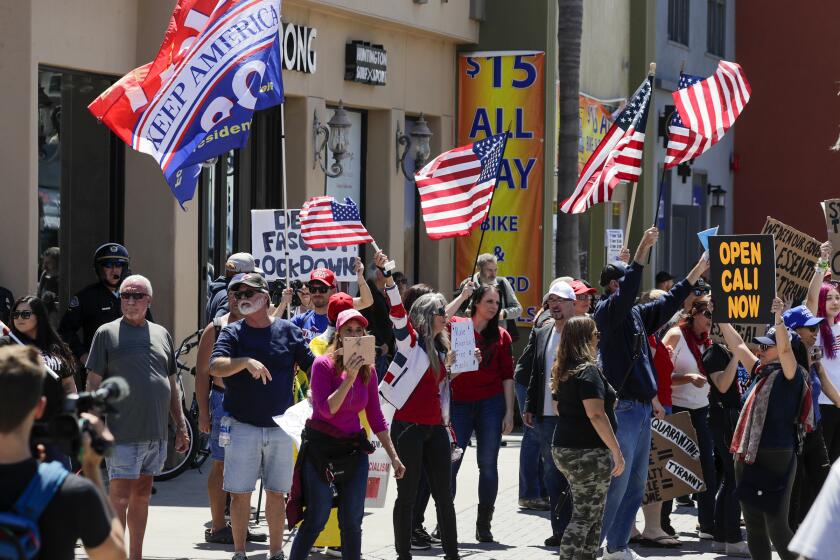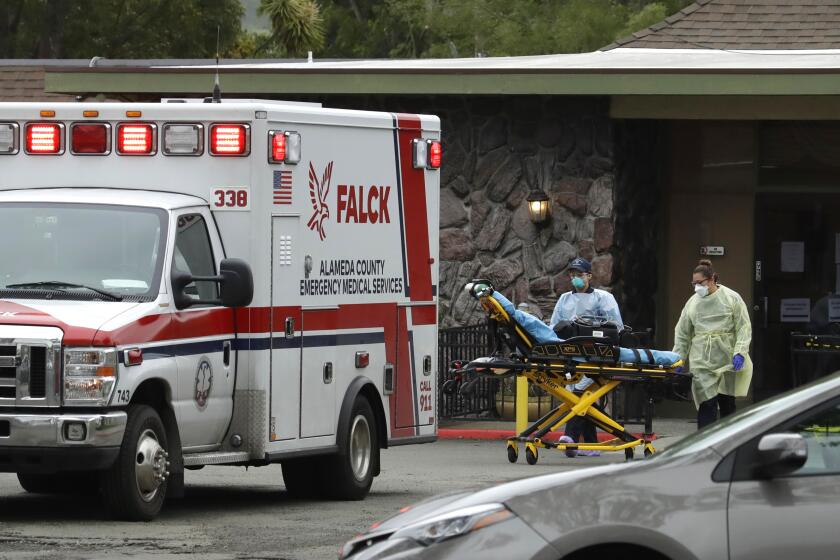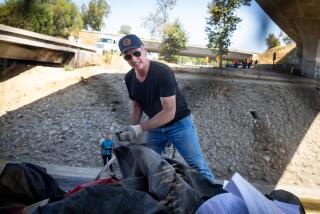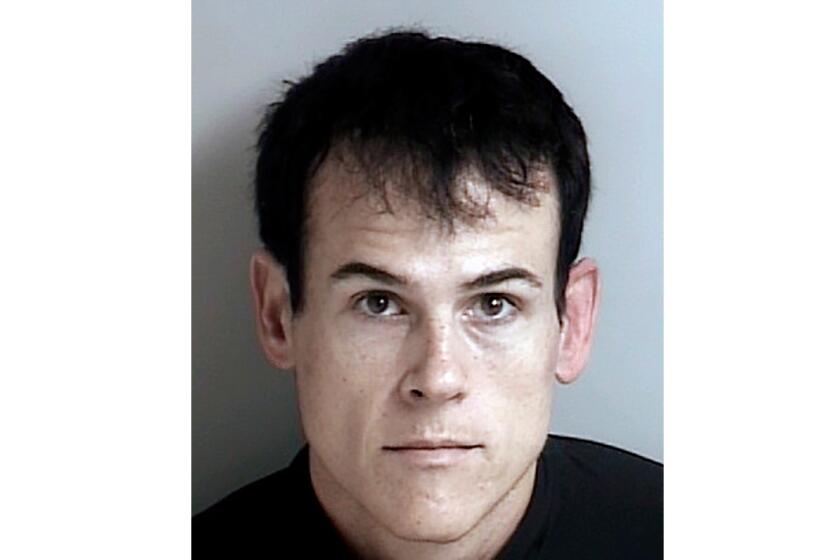Some cities are blocking California efforts to protect homeless people from coronavirus, Newsom says

- Share via
SACRAMENTO — California’s effort to move homeless people into hotel and motel rooms to protect them from the coronavirus has gotten thousands off the streets, Gov. Gavin Newsom said Saturday, but advocates say the program has been slow and uneven in some areas, hampered by red tape and local opposition.
Appearing at a Motel 6 in Campbell in hard-hit Santa Clara County, Newsom said Saturday that his Project Roomkey has so far secured 10,974 hotel and motel rooms for homeless people and that 4,211 — about 38% — are occupied.
Newsom cited “real progress in just a few weeks to procure these sites to start getting people off the streets, out of the shelters and into these safer settings.”
The governor, who wore a protective face mask as he arrived at the event, also announced that the Motel 6 chain has offered to house homeless people at an additional 47 motels in 19 California counties that have about 5,025 rooms.
Still, he acknowledged that Project Roomkey is facing some obstacles at the local level. Cities, including Laguna Hills in Orange County, are fighting efforts to put homeless people in hotels.
“Cities are blocking these efforts at a time of crisis,” Newsom said without naming any resistant municipalities. “Cities that are blocking those efforts — please consider the morality of those decisions.”
The original goal of the governor’s project was to secure 15,000 rooms throughout California so that homeless people could protect themselves from conditions such as those on the street and in crowded homeless shelters, where the coronavirus can spread.
But the effort is moving too slowly, said Elizabeth A. Mitchell, an attorney for the L.A. Alliance for Human Rights, which last month sued Los Angeles city and county officials to force action.
Setting a goal of providing 15,000 hotel and motel rooms is laudable, she said.
“Yet it is not happening fast enough, nor do they have anywhere near the number [of rooms] needed,” Mitchell said Friday. “They seem to be bogged down with bureaucratic procedures and are not moving with the alacrity and urgency needed.”
California has the largest homeless population of any state in the country — with some 108,000 people living on the street or in vehicles. Public health officials worry people in crowded homeless encampments are particularly susceptible to the spread of the virus.
Coronavirus: Newsom tells protesters of stay-at-home order he will be swayed by science, not politics
The pandemic has infected nearly 30,000 Californians, including more than 1,000 who have died.
Newsom announced a month ago that money was being allocated to provide hotel and motel rooms and trailers to house medically vulnerable homeless people including those exposed to the virus.
California was the first state to receive Federal Emergency Management Agency approval to provide shelter to tens of thousands of homeless people. At that time, the state and county agencies had moved 869 homeless people off the street and identified 6,867 hotel and motel rooms that were available.
The governor allocated $50 million to buy or lease hotel and motel rooms to provide at least 90 days of shelter for medically vulnerable homeless people, and $100 million more for grants to provide support services.
The housing program prioritizes homeless people who are at high risk, including those over age 65 and those with underlying health conditions, and those who have been exposed to or tested positive for the coronavirus and don’t require hospitalization, but who need to be quarantined.
Newsom said Saturday that he is in discussions with legislative leaders about the possibility of buying some of the motels where homeless people have been sheltered with the idea of providing more permanent housing.
Still, Newsom acknowledged this week that the program’s record has been mixed. Homeless people are in motels and hotels in 42 of the state’s 58 counties, he said.
“I deeply recognize the disparities within cities and counties about how quickly some people are utilizing the resources the state has been making available and how others are still struggling to do that,” Newsom said Thursday.
The governor said the state will “help support those that aren’t able to quickly amass their resources to match our resources.”
Counties are responsible for making the program happen, and Newsom singled out Los Angeles County among others for doing a good job at moving the homeless to hotel rooms.
Los Angeles County has about 60,000 homeless people, including some 36,000 living in the city of Los Angeles. The county has separately set its own goal of putting 15,000 homeless people in hotel rooms.
So far, the Los Angeles Homeless Services Authority has placed 629 homeless people in 10 hotels and motels countywide, with a target of reaching 1,000 people by the end of next week, according to Heidi Marston, the agency’s interim executive director.
“Among the devastating impacts of COVID-19, the swift action of our response and the momentum we are gaining, brings a glimmer of hope to people experiencing homelessness, that we know how to and can resolve our homelessness crisis,” Marston said Friday.
Nursing homes have become a tragic focal point of the coronavirus crisis, accounting for a large percentage of COVID-19 deaths.
San Bernardino County has, as of Friday, placed 231 homeless people in hotel and motel rooms and trailers, while Riverside County has sheltered 318 people with hopes of helping more by the end of this week, representatives said.
“We have had an outpouring of support from the hotel and motel industry and have been placing these individuals throughout all of Riverside County,” said county spokeswoman Brooke Federico, noting that businesses have offered more than 2,000 rooms.
“The intention of this program is to protect some or most vulnerable residents,” she said, adding that the county is working on eventually moving people into more permanent housing.
But other counties have lagged. Project Roomkey has so far seen “varying results around the state,” said Christopher Martin, a legislative advocate for the advocacy group Housing California, which supports the governor’s program.
One challenge Martin has seen is securing support services for each motel where homeless people are housed.
“They need to secure meals, medical services, and in many places security since motels have street-facing doors,” Martin said.
Some counties have identified hundreds of hotel and motel rooms, but the number of people occupying rooms is much smaller.
Orange County has placed 37 homeless people in hotel or motel rooms as of Friday, including 18 who are sick or symptomatic of COVID-19, the disease caused by the coronavirus, and who are isolated in a motel in the city of Orange.
Overall it has arranged for the potential use of 545 rooms at hotels and motels in Anaheim, Huntington Beach, Laguna Hills, Stanton and Orange, although the first two cities will start receiving people next week, according to Jessica Good, a spokeswoman for the county Health Care Agency.
The county’s plan for the Laguna Hills Inn has been temporarily placed on hold after a lawsuit by the city of Laguna Hills sought to block converting the 76-room hotel into temporary housing and medical facilities for those without shelter.
The city argued that putting sick and at-risk homeless people in the Laguna Hills Inn created a potential health risk for customers of nearby businesses and residents of surrounding neighborhoods. A court hearing is scheduled for Monday.
When asked about the governor’s criticism Saturday, Laguna Hills spokeswoman Cindy Sands said in an email that “community health and safety is our top priority.”
The program is being managed in Orange County by Illumination Foundation, which will provide medical oversight, security, on-site meals and support services.
Those housed in the hotels will be able to leave only by a van provided by the foundation and no visitors are allowed in order to follow self-quarantine and isolation protocols, Good said.
FEMA agreed to reimburse the state and counties for up to 75% of the costs of the sheltering program, which also provides meals, security and cleaning services.
“Homeless Californians are incredibly vulnerable to COVID-19 and often have no option to self-isolate or social distance,” Newsom said when he announced the program. “By helping the most vulnerable homeless individuals off the street and into isolation, California can slow the spread of COVID-19 through homeless populations, lower the number of people infected and protect critical healthcare resources.”
The state also has set a goal of purchasing 1,305 trailers to be used by local governments to shelter homeless people away from others. On Saturday, Newsom said the state has so far secured 1,133 trailers that are spread across 13 counties.
“Without these isolation units, their only choice is to return to a congregate shelter setting or back to an encampment — both of which would lead to further spread of COVID-19,” the governor’s office said in the statement announcing the program.














